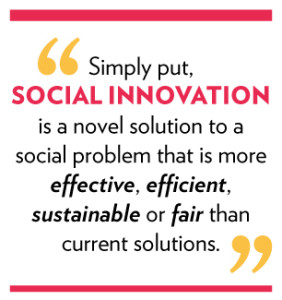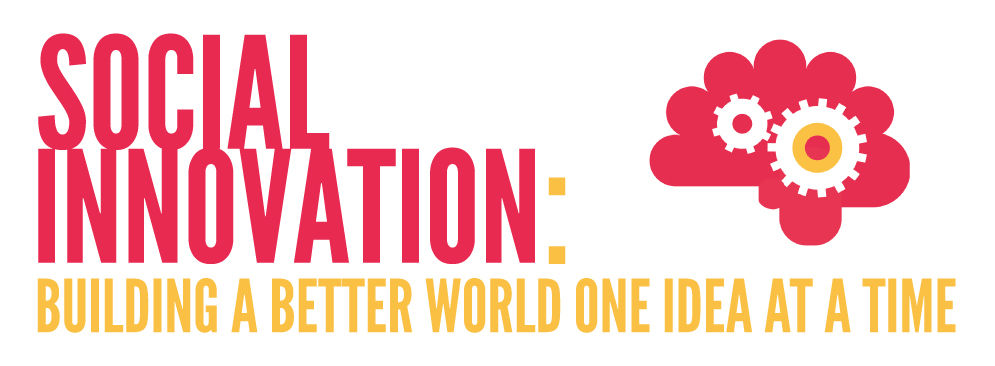What exactly is “Social Innovation”? Definitions tend to be long-winded, convoluted and wide-ranging. It’s easy to get bogged down in the debate over nuance, and lose sight of the title’s true value. Simply put, social innovation is a novel solution to a social problem that is more effective, efficient, sustainable or fair than current solutions. It is also important that the outcomes primarily benefit society rather than an individual. In short, a social innovation is an idea that works for the public good, putting people and the planet first. Some social innovations are revolutionary – they carry the punch to modify entire systems, permanently altering the perceptions, behaviours, and structures that are ultimately responsible for the challenges arising in the first place.
Social innovations can take place anywhere – in the for-profit, non-profit and public sectors. They originate from individuals, groups or organizations and are happening increasingly in the spaces between these three sectors as experience and perceptions come together to spark new ways of thinking.
Some recent examples of social innovation include the following:
Charter Schools
- Publicly-funded primary or secondary schools operating without regulations which typically apply to public schools, allowing administrators, teachers, and parents the freedom and opportunity to develop innovative teaching methods.
Emissions Trading
- A pollution-control program using economic incentives to reduce emissions. Permits to pollute are issued to participating businesses including a set cap (which reduces over time) on the total amount of certain pollutants that can be emitted. Those with higher emissions can purchase credits from businesses that have reduced their own emissions.
Fair Trade
- An organized movement establishing high trade standards for products such as coffee, chocolate, and sugar. By certifying traders who pay producers a living wage and meet these standards, the fair trade movement improves the quality of life of farmers and promotes environmental sustainability.
Two other types of social innovation are social entrepreneurship and social enterprise. Like social innovation, these terms carry no common definition across all platforms. What we know for a fact is that there is no legal business form with the title, “social enterprise”. Common themes across all definitions include the following: social enterprises are businesses which positively impact the community and social values. Furthermore, they limit or do not distribute profits and assets to individual share holders. Social enterprises are much more a means to achieve value – they are a verb, not a noun.
 Although social entrepreneurship and social enterprise have become popular rallying points for those working toward a better world, they are not imperative to social change. While they are very positive and valuable tools, neither of these notions is sufficient on their own with regards to understanding and generating social change. Social innovation is a much more adequate and comprehensive vehicle. Social innovation emphasizes ideas and solutions which create social value, not to mention the processes through which they are generated. Where social entrepreneurship and social enterprise focus on individuals and organizations, social innovation focuses on a much bigger picture.
Although social entrepreneurship and social enterprise have become popular rallying points for those working toward a better world, they are not imperative to social change. While they are very positive and valuable tools, neither of these notions is sufficient on their own with regards to understanding and generating social change. Social innovation is a much more adequate and comprehensive vehicle. Social innovation emphasizes ideas and solutions which create social value, not to mention the processes through which they are generated. Where social entrepreneurship and social enterprise focus on individuals and organizations, social innovation focuses on a much bigger picture.
Social innovation exists here in Windsor-Essex, though opportunity abounds. In 2015 WEtech Alliance and Pathway to Potential formed a unique collaborative partnership to move social innovation forward, with the support of a 20-month Ontario Trillium Foundation grant. Reducing poverty, creating jobs, and making our local economy more resilient is the heart of our strategy. We’ve been doing this by educating and engaging the community about social innovation and its importance, and increasing non-profits’ and entrepreneurs’ capacities to innovate through one-on-one advisory services and educational seminars. The second phase of the grant will focus on several areas:
- Embedding social innovation into what our community members already deliver, through:
- Social Procurement Policies- to help drive inclusive economic growth
- Curricula – to support skill building for social innovation management and governance
- Exploring the feasibility of a social innovation Shared Space – sharing space reduces costs, improves collaboration, and enhances impact
- Continuing to support non profits in their desire to pursue social enterprises
For more information about our initiatives, or how we can help, please contact:
Cathy Mombourquette
Director of Social Innovation
226.773.2816
Join the Social Innovation conversation online using #SocInn #YQG




